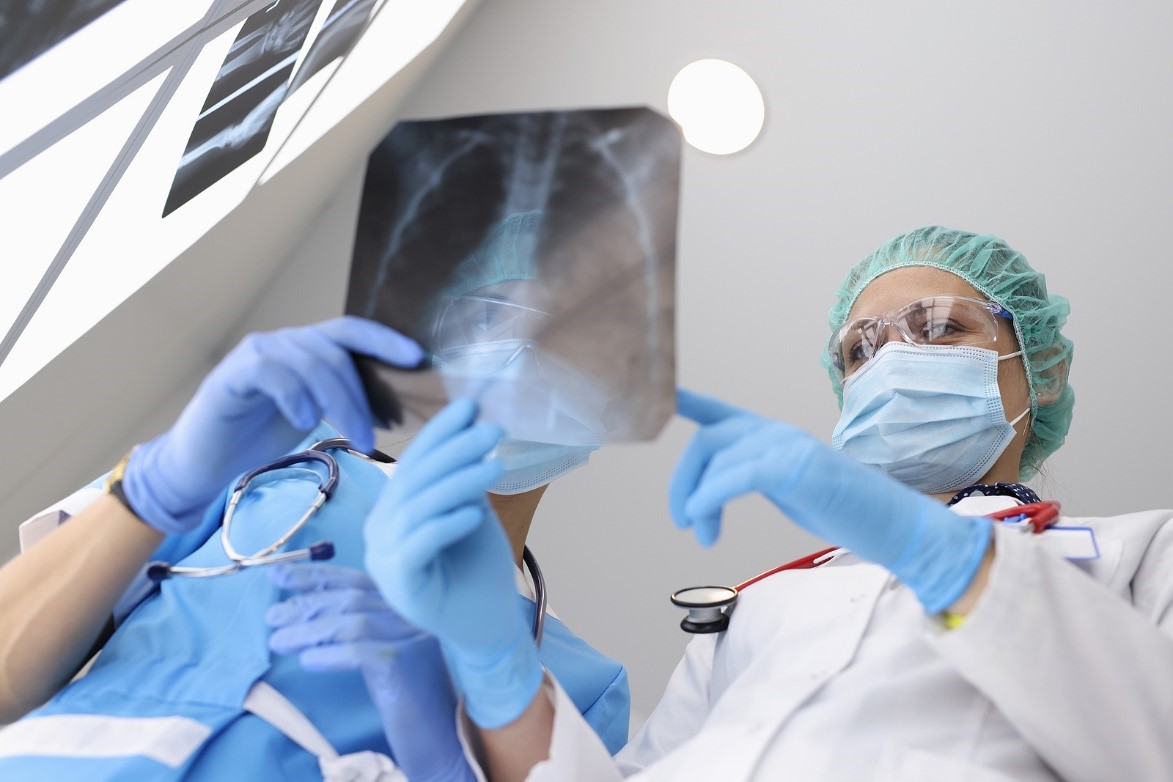
Pneumonia resulting from COVID-19 is a serious health concern. The scientific community has focused on the clinical and radiological characteristics of COVID pneumonia which is life-threatening. Be prepared to identify and seek treatment for symptoms of pneumonia resulting from a bout with COVID-19. Here is what you need to know.
Definition of Pneumonia
Pneumonia develops when a bacterial or viral infection damages and inflames the lungs significantly and can be extremely dangerous, even life-threatening, regardless of the bacteria or virus that is causing it. The virus that causes COVID-19 causes lung inflammation which can quickly lead to COVID pneumonia.
When COVID pneumonia develops, it can lead to symptoms such as:
- Shortness of breath
- Increased heart rate
- Low blood pressure
Like other pneumonia-causing respiratory infections, COVID-19 can cause lung damage. When the damage is severe, it can create long-term consequences. According to preliminary findings, up to a third of COVID pneumonia patients show signs of scarring on X-rays or lung tests one year after infection.
The signs and symptoms of COVID pneumonia are similar to those of other types of pneumonia and can result in fever, chills, and cough, which may result in shortness of breath and chest pain that happens when you breathe deeply or cough.
Pneumonia can worsen in people with severe COVID infections. Low oxygen levels and difficulty breathing are two symptoms to watch for. Pneumonia can progress to ARDS (Acute Respiratory Distress Syndrome) if it’s not treated quickly enough.
Diagnosing COVID Pneumonia
COVID-19 is diagnosed with a test that looks for viral genetic material in a respiratory sample. You may be asked to swab your nose or throat to gather a sample for testing.
A chest X-ray or CT scan may also be used in the diagnostic process. Studies of your blood in the lab can help determine the severity of the illness.
When to Seek Emergency Care
Immediately seek emergency care if you have trouble breathing, persistent feelings of pressure or pain in the chest, a rapid heartbeat, confusion, a bluish color of the lips, face, or fingernails, and trouble staying awake.
How COVID Pneumonia is Treated
As of this writing, the treatment for COVID-19 has yet to be approved. Various drugs are being researched. Right now, the treatment of COVID pneumonia is based on supportive care. This entails reducing patient discomfort and ensuring proper oxygen levels.
Oxygen therapy is commonly used to treat COVID pneumonia in patients. A ventilator and intubation may be required in severe cases. Secondary bacterial infections can occur in people with viral pneumonia. Bacterial infections can only be treated with antibiotics.
COVID Pneumonia Recovery Time
Whatever the cause of pneumonia, it can take weeks or even months to fully recover.
When recovering from COVID pneumonia, the body must first repair lung damage, then deal with the removal of any remaining fluid or debris, and then finally, deal with scarring until the tissue has fully healed.
For the 15% of infected people who develop moderate to severe COVID-19, they admitted to the hospital and require oxygen. The average recovery time ranges between three and six weeks. Recovery can be much more difficult for the 5% of patients who experience severe or critical COVID related illness. (Healthline, 2020)
Everyone’s recovery is unique and depends on overall health, whether there are pre-existing conditions and the severity of infection.
The Bottom Line
The signs and symptoms of COVID pneumonia can be similar to those of other kinds of pneumonia. Researchers, on the other hand, have discovered changes in the lungs that point to COVID pneumonia as the source of the illness.
Patients with COVID pneumonia require supportive care to help them cope with their symptoms. There are steps to lowering the risk of developing COVID pneumonia, even if it cannot be prevented. Protect yourself from COVID-19 and take precautions like using infection control measures, managing any underlying health conditions, and keeping track of your symptoms.
Seek emergency care when COVID pneumonia symptoms occur. Time is of the essence with pneumonia as our hospitals and medical personnel are taxed by the sheer number of diagnoses. Waiting for treatment can affect recovery. We need to stay vigilant and protect ourselves from exposure to COVID-19.
Works Cited:
Nazario, Brunilda. “Pneumonia and Coronavirus: Does Everyone With COVID-19 GET Pneumonia?” WebMD, WebMD, 13 Aug. 2021, www.webmd.com/lung/covid-and-pneumonia#1.
Person. “Coronavirus and Pneumonia: COVID-19 Pneumonia Symptoms, Treatment.” Healthline, Healthline Media, 9 June 2020, www.healthline.com/health/coronavirus-pneumonia
